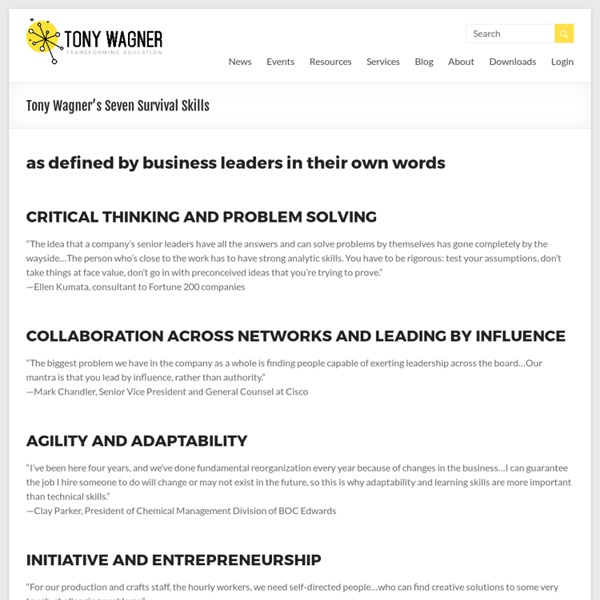Tony Wagner’s Seven Survival Skills

The Other 21st Century Skills: Educator Self-Assessment
Chartkamp–I think I understand what you are saying, but in any scenario, someone, or something will spur the impetus for learning to occur. We could have a toddler go about and learn the world from scratch, but I don’t think anyone would say that is as efficient and as effective as a “parent” facilitating, or at least providing for a safe environment. And the better the parent, the more effective the toddler will be at contributing to the learning within the community as he/she progresses. Can you describe what you mean by informal learning?
The 2014 Honor Roll: EdTech’s Must-Read K–12 IT Blogs
Every year, thousands of educators flock to annual conferences to hear what the best and brightest minds of the industry are up to. But what if you could hear from these luminaries every day? That's part of what makes our latest list of the top 50 K–12 ed tech blogs special. We're lending a spotlight to some of the biggest conversation starters in educational technology today. These bloggers represent nearly all aspects of K–12 education, from teachers and administrators, to strategists and technicians. The majority of these blogs are new to EdTech: Focus on K–12's honor roll. If your blog is on our list, be sure to grab a Must-Read IT Blog badge for your site. 2 Cents Worth (EdTech 2012 & 2013 Top Blogger) Collecting the unconventional posts from the clan of David Warlick, a 35-year educator with experience as a classroom teacher, district administrator and technology integration consultant. Read the blog: 2cents.onlearning.us Ask a Tech Teacher Read the blog: askatechteacher.com Dy/Dan Twist
The Global Search for Education: Digital | C. M. Rubin
"We live in a world now where anybody can ask any question anywhere and get thousands of answers within seconds, but it is up to the questioner to determine which of those answers are legit, which are false, which are intentionally misleading." -- Howard Rheingold If you think educating an individual to be digitally literate is difficult today, just imagine what it will be like 5 years from now? Howard Rheingold, the California-based writer, critic, teacher, and Internet pioneer, will be the featured guest at Education Fast Forward 13 on May 7th in Norway. "America stands on the brink of disaster. Howard: How would you define a digitally literate person in a classroom today? When I decided to write a book about the essential literacies necessary today -- with the aim of using the book as a text for a Stanford course -- I decided that the essential literacies are attention, crap detection, participation, collaboration, and network awareness. America stands on the brink of disaster. Yes.
Related:
Related:




souvent peu utilisé dans le domaine de l'éducation physique, il ne faut pas oublier que le cegep sert à rendre compétent les étudiants. on retrouve ici quelques point important faisant d'un professionnel, un professionnel, être un leader, innover, motiver etc. il est intéressant de réfléchir à ces enjeux dans un contexte d'éducation physique. amener les étudiants à réaliser que le marché du travail est un milieux stressant peu être un motivateur à l'appropriation de technique de relaxation. On peut aussi démontrer que l'accomplissement de soi ou le dépassement de soi par une activité physique est bénéfique à l'estime et qu'il en faut pour passer en entrevue d'embauche. by jasenchabotmaheux Feb 27